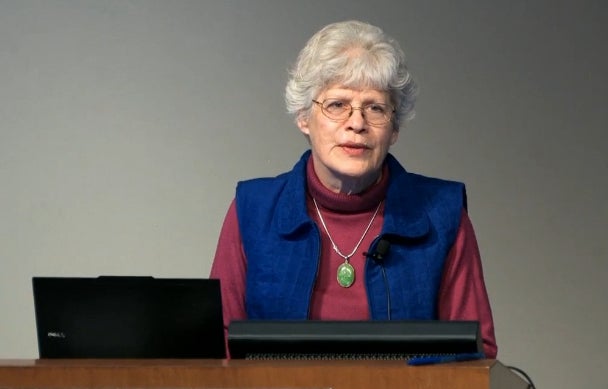The Dictionary of American Regional English, based at the University of Wisconsin-Madison, may soon end its work documenting regional language differences due to a lack of funding.
Joan Houston Hall is the chief editor of the dictionary, also known as DARE. She said that in recent years, the project’s annual budget has been around $520,000. When the new fiscal year begins in July, it will start with less than $100,000.
“Obviously, that will not support us, and we are eager to find foundations, individuals, anyone who is interested in helping to … keep us going,” said Houston Hall.
News with a little more humanity
WPR’s “Wisconsin Today” newsletter keeps you connected to the state you love without feeling overwhelmed. No paywall. No agenda. No corporate filter.
Houston Hall described the mood of project staffers as “glum,” and said layoffs and non-renewals have been sent to staff, including herself.
The dictionary has been in publication since the 1960s. As an example of the intricacies of language it catalogs, Houston Hall pointed to an email she received from a doctor who grew up in Maine and worked in western Pennsylvania early in his career. She said a male patient came in and told the doctor he was “rifting” and had “jags” in his “leaders.”
“The poor doctor had no idea what he was talking about,” Houston Hall said. “But, if he had had DARE, he could have looked it up to see that ‘to rift’ means to belch, and it’s very understandable that it would be heard in Pennsylvania because it’s a Scots word and Pennsylvania had very heavy immigration from Scotland.”
Houston Hall said to have “jags” in one’s “leaders” means an individual has sharp pains in the tendons in the front of their neck. It’s an example, she said, of how DARE has the kind of folk and regional information people won’t necessarily find anywhere else.
Over the years, Houston Hall said DARE has applied for and received grants from the National Endowment for the Humanities and the National Science Foundation, and has gotten support from private foundations, the UW, and private foundations.
The dictionary has previously survived financial tight spots. One example occured two years ago when DARE was working to complete digitization of the project. Layoff notices were sent then, too, but the project was able to get support from a number of sources, including the University of Wisconsin College of Letters & Science and others at the school.
However, Houston Hall said she doubts UW can help this time, writing in an email: “They were extremely helpful then. I think they feel that that was the extent of the help they can provide, and with the impending cuts from the state, the situation for them is extremely difficult right now.”
The College of Letters & Science at the University of Wisconsin had no comment, according to a UW spokesperson.
Also, Houston Hall noted it’s difficult to get federal funding because federal agencies have seen funding reductions themselves and because of Congress’ open access mandate. The DARE is published by Harvard University Press, which means the digital version of the dictionary is available by subscription only.
If the project can’t find more funding, Houston Hall said she believes one editor will continue to add new entries to the digital version of the DARE. Houston Hall said she will either retire or cut back on her time and try to figure out how to close the project down.
Wisconsin Public Radio, © Copyright 2026, Board of Regents of the University of Wisconsin System and Wisconsin Educational Communications Board.



